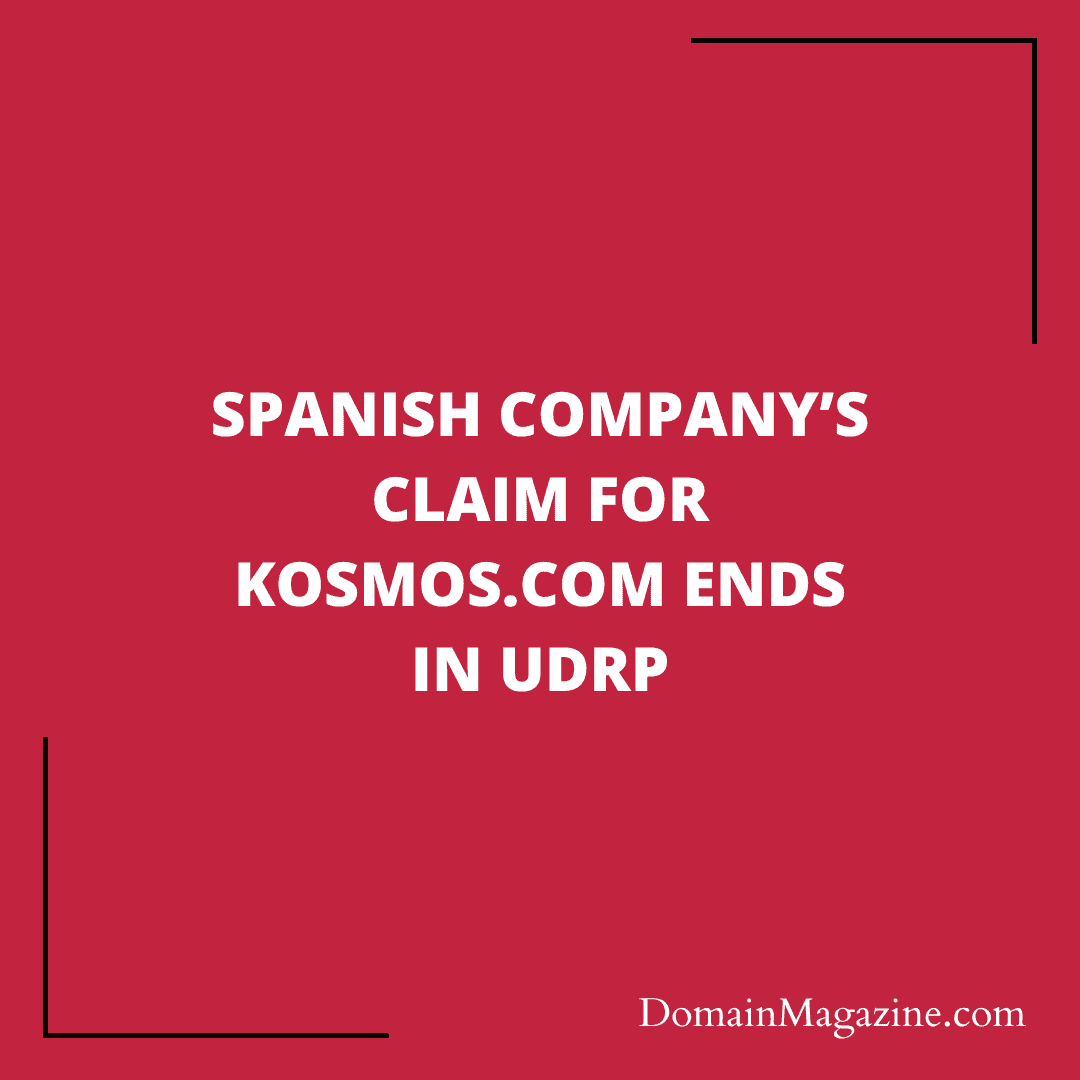Today we are going to discuss a case regarding the domain name Kosmos.com. The domain name was contested by a Spanish company named Kosmos Global Holding. The company dealt with ports, media, and entertainment. However, the recent registration of the mentioned domain name prompted the entity to file a Complaint.
Complainant’s argument
The Complainant in this case argues that they have rights to a certain trademark, which is identical to the Disputed Domain Name. The Complainant further claims that the Respondent has no legitimate rights or interests in the Disputed Domain Name and has registered it in bad faith.
The Complainant states that there is no evidence of bona fide or fair use of the Disputed Domain Name by the Respondent, nor is the Respondent commonly known by the Disputed Domain Name. The Complainant alleges that the Respondent registered the Disputed Domain Name and other domain names targeting the Complainant and attempting to sell the Disputed Domain Name to the Complainant.

Finally, the Complainant asserts that the Respondent’s bad faith is implicit in the registration of the Disputed Domain Name because it was registered for a name similar to a popular word in many languages. The Complainant claims that the Respondent’s intention is to register domain names for popular names to resell them to companies in the market. The Complainant argues that the Disputed Domain Name is being used in bad faith, which constitutes a breach of Article 2 of the UDRP and renders the registration in bad faith.
In summary, the Complainant’s argument is that the Respondent registered and is using the Disputed Domain Name in bad faith, with the intention to sell it to the Complainant or others, and without any legitimate rights or interests in the domain name.
Respondent’s rebuttal
The Respondent argues that they have legitimate rights and interests in the Disputed Domain Name because they possessed it prior to the Complainant’s existence. They claim that “kosmos” is a common dictionary word and that offering a non-exclusive and non-distinctive term for sale does not violate the Complainant’s limited rights. Additionally, they assert that the Disputed Domain Name was never used for any purpose related to the Complainant’s services, so there was no illegitimate use even if the Respondent’s senior interest was ignored.

The Respondent contests the Complainant’s interpretation of the bad faith element of the UDRP and claims that the mainstream UDRP jurisprudence has rejected the notion of retroactive bad faith registration for years. They argue that even if the Complainant’s interpretation was applied, the fact remains that the Respondent acquired the Disputed Domain Name prior to the Complainant’s existence and has engaged in no infringing use relative to the Complainant’s limited scope of rights.
Finally, the Respondent argues that the Complainant omitted evidence of an email from their counsel to the Respondent’s authorised broker, which included an offer to buy the Disputed Domain Name. They claim that this case is yet another “Plan B” UDRP proceeding, where a junior trademark registrant attempts to purchase a domain name from a senior domain registrant and launches a UDRP when they are unsatisfied with the normal market pricing.
Jury’s Judgement
the Panel considered each of the three elements that the Complainant was required to prove under the Uniform Domain Name Dispute Resolution Policy (UDRP). These elements are:
(i) The Disputed Domain Name is identical or confusingly similar to a trademark or service mark in which the Complainant has rights;
(ii) The Respondent has no rights or legitimate interests in respect of the Disputed Domain Name; and
(iii) The Disputed Domain Name has been registered and is being used in bad faith.

Regarding the first element, the Panel found that the Complainant had established its rights in a registered figurative trademark that prominently includes the term “KOSMOS”. The Panel concluded that the disputed domain name was confusingly similar to the Complainant’s trademark.
Regarding the second element, the Panel found that the Respondent could have a legitimate interest in registering and holding the disputed domain name, provided that this was not done with the intent to target the Complainant. The Panel determined that the Respondent had not targeted the Complainant or its mark and therefore had a legitimate interest in the disputed domain name.
Regarding the third element, the Panel found that the Complainant had failed to demonstrate that the Respondent had registered and was using the disputed domain name in bad faith. The Panel determined that the Respondent had not registered the disputed domain name with the intent to sell it to the Complainant or to a competitor of the Complainant.
Based on its analysis of these elements, the Panel concluded that the Complaint should be denied and that the disputed domain name should remain with the Respondent.
RDNH
In this case, the Respondent did not formally request a finding of Reverse Domain Name Hijacking (RDNH), but the Panel found it necessary to consider the issue. if the Panel finds that the Complaint was brought in bad faith, for example in an attempt at RDNH or primarily to harass the domain-name holder, the Panel shall declare in its decision that the Complaint was brought in bad faith and constitutes an abuse of the administrative proceeding.
The Panel found that the Complaint was brought in bad faith and constituted an abuse of the administrative proceeding for the following reasons:
- The Complainant misrepresented the facts regarding its trademark rights. The Complainant stated several times that it owned various registered trademarks, but it appeared that many of these trademarks were not validly registered yet.
- The Complainant omitted relevant evidence, including an email from its counsel to the Respondent’s authorised broker.
- The Complainant is professionally represented in this matter and knew or ought to have known that it could not succeed as to the second and third element of the Policy for the reasons set out above.
In particular, the Panel found that the Complainant’s representatives quoted extensively from UDRP case law, and it was unlikely that they were unaware of the current overwhelming view of UDRP panellists as to the need to prove registration as well as use in bad faith and that the more than 10-year-old cases cited in that regard are no longer relevant.
Therefore, the Panel found that the Complaint was brought in bad faith and constituted an abuse of the administrative proceeding, and the Complainant engaged in reverse domain name hijacking.
You can read the case in full detail here.


Join the Discussion